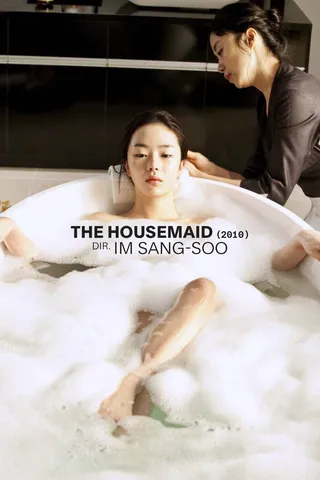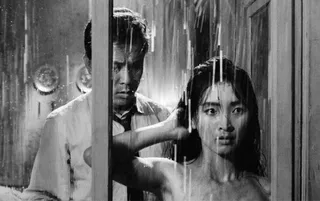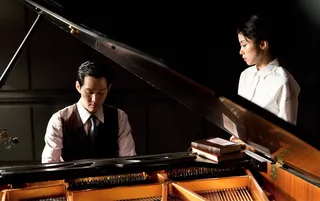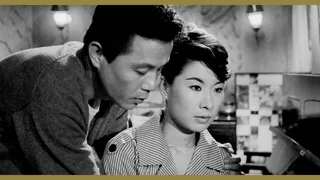Help Wanted
By Lawrence Osborne

The Housemaid, dir. Im Sang-soo, 2010
Help Wanted
In the 1960s, the social-climbing thriller The Housemaid roiled South Korean society. A remake in 2010 managed to do it again.
By Lawrence Osborne
January 31, 2025
When Kim Ki-young’s The Housemaid appeared in cinemas in South Korea in 1960, it produced a shock wave every bit equivalent to the reputation of the director himself—a conspicuously tall, big-bodied renegade described by people who knew him as a forbiddingly intense giant. A former documentarian with the United States Information Agency during the Korean War—and previously a medical student who had spent much of the early 1940s in Japan absorbing the films of Fritz Lang, Greek tragedy and experimental theater—Kim made his directorial debut in 1955 with a film called The Boxes of Death, an anti-Communist feature about the foiling of a terrorist plot foisted by the North upon the South. It was followed by Yangsan Province (1955), a costume drama whose popular success could never have foreseen the violently expressionist mood of The Housemaid, a cinematic provocation that now ranks as one of the most influential Korean films of all time. The plot: An aspiring middle-class family hires a young, attractive maid who slyly seduces the head of the household and unleashes disaster upon the whole house. Adultery, blackmail and madness made for a subversively explosive cocktail in the conservative Korea of 1960. Kim went on to make an arguably even greater film, 1963’s historical drama Goryeojang, about a man who carries his mother into the mountains to die (an ancient rural custom in the medieval period, when food was scarce), but The Housemaid was the film that made him a global name with instant succès de scandale upon its release.
From left: Jeon Do-yeon and Seo Woo in The Housemaid (2010); Jeon Do-yeon and Lee Jung-jae in The Housemaid (2010)
Indeed, Kim has been hailed as a foundational inspiration by the leading lights of current Korean cinema, cited by Park Chan-wook, Bong Joon Ho and Lee Chang-dong. Bong recognized The Housemaid as the key inspiration for his class-war masterpiece Parasite. But it was director Im Sang-soo who tackled the dangerous mores of the film head-on with his sinisterly beautiful remake in 2010.
In most ways, the two films could not be more different. In part this is because the South Koreas of 1960 and of 2010 are so vastly dissimilar, even if there are obvious continuities. Both films are fairy tales of rebellion against Korea’s rigid class system and both are dark sexual fables—but the world of the 1960 film, with its postwar poverty and grinding social-climbing, seems like it exists in a different galaxy from the neurotic, young West-obsessed billionaires of Im’s tale, living as they do in palatial hilltop mansions where they play Beethoven on grand pianos before breakfast and whose walk-in closets are the size of urban spas.
But first, the world of 1960. In that year South Korea’s per capita GDP was roughly as low as Thailand’s. Years of war and Japanese occupation, followed by the Korean War, had created a tough, hardscrabble society obsessed with lifting itself out of poverty. Although Kim’s film takes place almost entirely inside a cranky, dark little house, we feel the outside social tensions almost continuously. The film was actually inspired by a real-life murder case in the central rural city of Gimcheon, halfway between Seoul and Busan. At the start, husband and wife Kim Dong-sik and Mrs. Kim are reading a newspaper account of this very crime. He is a toiling music teacher at a local factory while Mrs. Kim is a housewife who makes extra money on the side doing tailoring work. They have two small children, a crippled girl and a rambunctious son. The article they are pondering is about a man seducing his maid. “Men are such fools,” Mrs. Kim remarks. “Taking interest in a maid!” “I disagree,” her husband retorts. “Look at us. We’re almost totally dependent on our maid.” The insinuation is that men are susceptible to fatal temptations and that maids are all too aware of the fact.
The action begins at the factory where Kim works. He teaches choir to a class of young female workers—the lone attractive male in their world, since they are all living in factory dorms. One young woman develops a crush on him. She is persuaded by her friend, Miss Cho, to write Kim an adoring letter in which she expresses her forbidden love for him.
From left: The Housemaid, dir. Kim Ki-young, 1960; The Housemaid, dir. Im Sang-soo, 2010; Parasite, dir. Bong Joon Ho, 2019
When Kim receives this love letter, he acts the upright prude and takes it straight to the factory supervisor, who promptly suspends the infatuated woman. Shortly after, the fired girl commits suicide, and Kim is obliged to attend her funeral, barely escaping a momentous scandal. Meanwhile, Miss Cho asks him for private piano lessons in the Kim household. It turns out that she dreamed up the idea of writing the letters because she, too, was in love with him. Before she confesses, she suggests to him that a friend of hers, a girl called Myung-sook, might work well as a maid for the Kim household. Since the Kims are making some progress up the greasy social ladder by dint of their laborious work ethic, they have moved into a larger house with an annex where Kim can entertain his piano students privately. They therefore need an extra pair of hands with all the added housework.
Enter the Fatal Maid. The role of Myung-sook is played by the enigmatic Lee Eun-shim, 25 at the time, who retired from acting almost immediately after The Housemaid was released and eventually moved to Brazil. She later explained that in her opinion she had no talent for acting and wasn’t interested in pursuing a career. Notwithstanding, Lee lights up the film from the center with her moody, jagged portrayal of a working-class factory girl implanted into the Kim’s family domain, described as “sacred” by Mrs. Kim herself. From the beginning, she manipulates the internal family dynamics, intuitively exploiting both the frictions between the children and the social insecurities and obsession with propriety of Mrs. Kim. Kim himself is just a man: He can be seduced without much difficulty. Weak in some crucial way, he veers between lust and terror of scandal. Eventually he makes Myung-sook pregnant and opens himself up to blackmail. Things spiral downward from there.
What makes Myung-sook such an interesting character is that she is not entirely malicious in her dealings with Kim. She is half operator, half girl raised in poverty and desperate to escape it. Moreover, the Kims themselves are hardly rich. Their house is like a ramshackle German Expressionist stage set (perhaps a nod to Fritz Lang); there are rats in the kitchen.
“Im Sang-soo’s remake is coolly decadent, visually opulent, saturated with nudity and sex, and far more terrifying.”
Im Sang-soo’s remake retains the vulnerability and ambiguity of Myung-sook’s character—renamed Eun-yi—but it aggressively ups the ante by taking us into the heart of 21st-century Korean hyper-success, the imposing marble edifice owned by a cold and glamorous young couple, the heavily pregnant Hae-ra and her imperious, Beethoven-loving husband, Hoon, played by Lee Jung-jae (who later found mainstream global stardom as the protagonist of Squid Game). Where the 1960 original was fraught with repressed sexual hysteria, Im Sang-soo’s remake is coolly decadent, visually opulent, saturated with nudity and sex, and far more terrifying. It is our present world, after all. The rich today are vastly richer, and the gap between them and the lower strata of society is even wider. The mutual alienation is exponentially greater.
The remake has remarkable performances as well. Youn Yuh-jung plays the older family maid. She’s a cynical eyewitness to the family immorality who drinks herself stupid with the master’s leftover Château Lafite and subjects herself to an ignoble silence in order to further her son’s career as a public prosecutor, an enormously prestigious station in Korea. She takes Eun-yi under her wing, aware how vulnerable she is, and how easily the younger woman’s half-knowing sexuality can both exploit and be exploited. The exceptionally difficult role of Eun-yi is played by Jeon Do-yeon (surely one of the greatest film actresses of the last two decades). Unlike the maid in the 1960 original, Eun-yi enters a world totally unfamiliar to her but to which she cunningly adapts, taking pleasure in the small offhand luxuries it affords her—the leftover expensive wine, the beautiful rooms, the luxurious food she can quietly pilfer. The stakes here seem higher, the game she plays more dangerous. The class stratifications and the suspicions they breed seem more lethal. And so it turns out.
From left: Kim Jin-kyu and Eom Aeng-ran in The Housemaid (1960); Seo Woo, Lee Jung-jae, Ahn Seo-hyun and Jeon Do-yeon in The Housemaid (2010)
Eun-yi is from a brutal world, discovered at the beginning sharing a factory-style capsule dorm room with a fellow worker, visiting her mother’s forgotten grave for a last time, and then suddenly whisked into a family scandal that might, played correctly, have landed her a profitable payout. Of course, being a fairy tale with evil outcomes, this is not what happens. Fairy tales are not about accomplished bank accounts. If Kim’s film ends tragically with a mass death, in Im Sang-soo’s version it is only the maid who immolates herself. Afterward, the spoiled family carries on as if nothing has happened: An ending that is simultaneously more understated and more chilling. In a bizarre act of heroicism, Eun-yi commits suicide in front of the family who have used her, and she does it as a final assertion of her defiance and hatred, hoping to inflict upon them a trauma they can never quite undo in their lives to come. That’s all she has left to give.
It would be easy to claim that the 2010 film is a satire of South Korea’s hierarchical capitalism and booming 21st-century economy, chalked with foreign investors. This would be the dull and predictable route. Gender politics? Even more pedestrian. The Housemaid is brisk, electrifying, deliberately slick, and saturated with sexual tensions that are not merely ugly and routine. It speaks of the hunger and secret needs of its characters. The pivotal moment in this disturbing tale is when Eun-yi, nonchalantly washing out one of the family bathtubs, is surprised by Hoon, who has returned from work to open an expensive bottle of red wine with his beautiful wife in another room. It’s a moment of revelation, when everything changes. Her dress hoisted over her thighs, Eun-yi looks over at him, dazzled and unknowing, both of them struck by lightning. Later, the older maid accuses her hated boss of exploiting Eun-yi by coming into her room uninvited and forcing her to have sex with him. But no, it is not quite that. As Eun-yi says, “I was waiting for him.”









